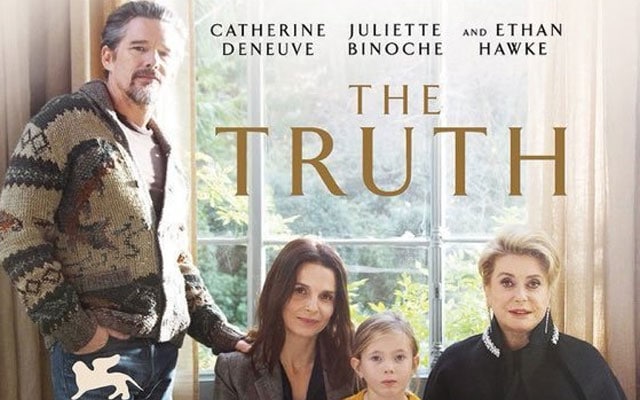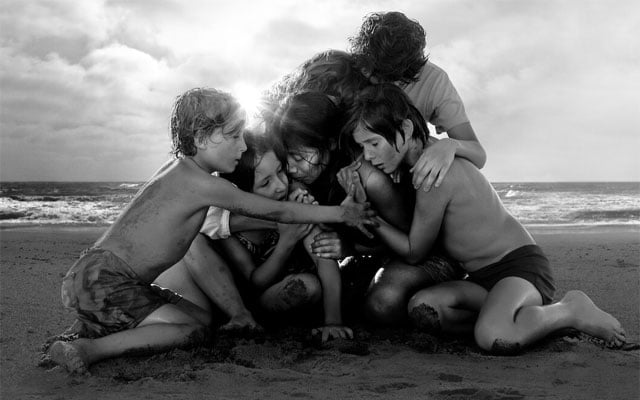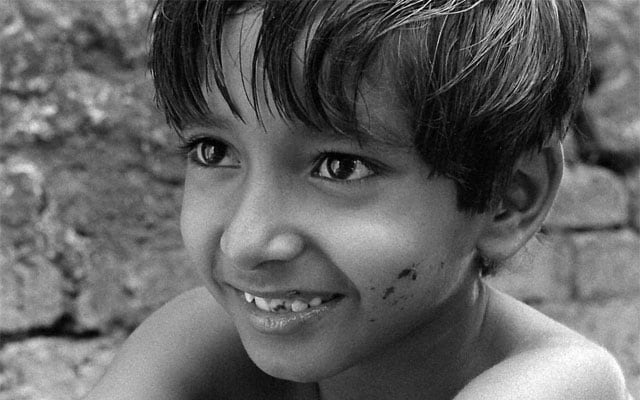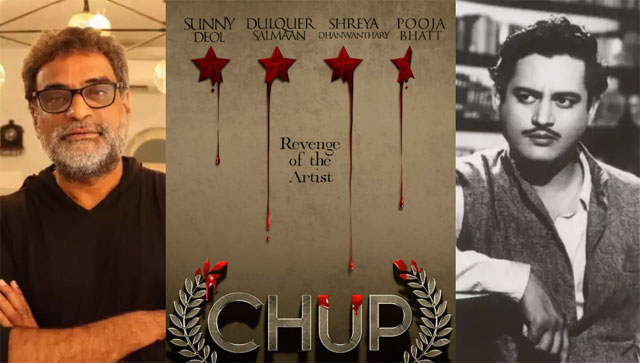When I finished watching R. Balki’s sixth film, and his finest work since Paa, I called him to ask if it is copied from any ingenious foreign source, maybe a Mongolian film.
The Mongolian plagiarism joke is in the film, and I wanted to show off to Balki, a close friend and a favourite filmmaker, about how closely I had watched his film. This, of course, was completely unnecessary. Balki is the kind of rare filmmaker who breaks the glass ceiling with every film without letting the shards pierce his purity as a filmmaker.
Chup: Revenge Of The Artist doesn’t have a single ounce of extra meat in its two hours and twelve minutes of intriguing storytelling. It is a cannily crafted super-smart serial-killer thriller about a florist’s revenge on film critics. The writing is razor-sharp. Every character, big or small, has sharp cunning lines to say. Even the wonderful Saranya Ponvannan as the heroine Nila’s blind mother, is so full of one-liners, she seems like Alexa in Kanjeevarams. .
Chup movie poster
Remember Arundhati Nag as Vidya Balan’s pawky mother in Paa? How does Balki think of such unconventional casting? How has he made Sunny Deol look so debonair and on-the-ball as the cop on the prowl looking out for the killer? Sunny’s cop is not given any personal life in the remarkably rugged but poised writing (by Balki, Raja Sen and Rishi Virmani): no disgruntled wife pouting about the unearthly hours he keeps, no girlfriend killed in a flashback. Only a psychiatrist- friend played by a crazily frizzle-haired Pooja Bhatt, who is brought in after intermission to ask the question every filmmaker wants to answer ever since the reviews trashed Guru Dutt’s Kaagaz Ke Phool: how does a critic’s mind work? Does he ever feel guilty about the trail of broken hearts he leaves behind when he trashes a film?
While I thoroughly enjoyed the thriller aspect of the plot, it was the central romance between the florist Danny (Dulquer Salmaan) and an entertainment journalist Nila (the very lovely Shreya Dhanwanthary), which had me enthralled. The way the romance grows through Sachin Dev Burman’s timeless songs from Guru Dutt’s cinema, especially Jaane Kya Tuney Kahi in Pyaasa and Waqt Ne Kiya Kya Haseen Sitam in Kaagaz Ke Phool, the way Danny cycles through miles of Mumbai’s bustling roads to meet Nila, the way she responds every time he looks at her….this is the most romantic, lilting liaison I’ve seen in a long time.
Dulquer needs no introduction to romancing the screen. But Shreya needs to be seen a lot more.
I wish there was a happy ending to their romance. Chup is sadly not the film where the immortal romantic songs of Guru Dutt come to any happy fruition. It is an intrinsically tragic world, like that of Gurru Dutt, backlit by the most wonderful ode to the wages of the heart.
Vishal Sinha’s exceptional cinematography capturing the foliaged by-lanes of Bandra in Mumbai like never before, it adds a luscious layer to the lashes of pain and longing which underline Balki’s liberating voyage into a shackled mind.
Chup is the film that should have gone to the Oscars. It is fiercely original and it delves deep into the darkest corners of a disturbed mind without losing sight of the light that brings a spark to every frame.
After the global success of Shoplifters in 2018, Hirokazu Kore-eda has become South Korea’s most hero-worshipped director next only to Bong Joon-ho. I confess I didn’t like Hirokazu Kore-eda’s last film The Truth much, where he was discernibly disoriented creating a film that was set outside his home country.

The Truth
The good news is, Hirokazu Kore-eda is back on home turf with his latest entitled Broker. No, it is not set in the financial world. The title refers to a baby-kidnapper Sang-hyeon (played by Song Kang-ho): that’s what he is, a kidnapper, though he thinks he is doing the world an altruistic turn by snatching babies from the church where women leave unwanted babies and giving them to childless couples. The cheque please?

A still from Broker
Remember Shramila Tagore in Aradhana, the unwed mother who leaves her baby in an orphanage and returns to reclaim it, only to discover it’s already been taken away? One such unwed mother aptly named So-young (Lee Ji-eun) shows up to get her baby back in Broker, only to discover that it has been taken away by baby broker Sang-hyeon and his partner Dong-soo (Gang Dong-won).
Now here is where the already-shaky plot thickens, with all three, the baby broker, his partner and the baby’s mother taking off for a road trip that seems as irrelevant to me as Umbrellas during a tsunami.
Why are the three travelling together with the baby, and also another 3-4 year old child who is an absolute scene-stealer? While the adults seem lost for motive, little Hae-jin seems to ask all the relevant questions, some of which even I wanted to ask the three protagonists.
What is the purpose of this journey? When all the protagonists seem so fond of the baby, why is it being given away, in fact sold, to a childless couple? Why can’t So-young keep the baby?
On the most rudimentary level of logistic sensibility, Broker falls short of conviction. Of course, the film is not an outright failure. I loved the bonding among the five travelers on the road trip. There are deep attachments that grow on the journey. But somehow, the crux of the journey, the spiritual core of the road trip, is unconvincing.
I loved the two female detectives who are trailing the five travellers, hoping to catch the broker and his baby-selling partner red-handed in the act. The two sleuths are constantly eating. Comfort food in a film that becomes progressively uncomfortable to watch.
We love the characters, but their motives remain shrouded in ambiguities. I wanted to know more about So-young’s background. We are told midway that she committed a heinous crime before fleeing with her baby. Why is she so determined to dig her own grave when happiness seems just a question of making the right decision?
Broker is not quite the film we expect from the director of Shoplifters and Our Little Sister. Its emotional leanings are abstruse and the characters behave neither consistently nor correctly. I suspect there is a truly great emotional drama hidden somewhere in this sassy politically incorrect dark satire. We will have to look for it some other time.
I thought Hirokazu Kore-eda’s 2018 film Shoplifters to be far superior to Broker, both in terms of its emotional velocity as well as its dramatic construction. There’s no mistaking the fact that both Alfonso Cuaron’s Mexican film Roma and Hirokazo Kore-eda’s Japanese Shoplifters are great films. And they deserved to win the Oscar for Best Foreign Film. Roma has walked away with the honour. But that doesn’t make it the better film.

A still from Roma
Both speak a universal language of the heart. They are both works that celebrate the joy of being part of a family, and in fact, tell us that a family is not what you are born with, but what you cultivate and nurture. In Roma, the house help, Cleo (Yalitza Aparicio), in an upper-class Mexican household, is more ‘family’ to her employers then family can ever be.
Director Cuaron follows the ups and downs in the fortunes of Cleo’s employers’ life neither judging them for their shortcomings nor congratulating them for their triumphs. Roma simply….moves on in susurrating rhythms that not only echo life, they also burnish those rhythms with intimations of eternity.
Such is the magic of great cinema. We get swept into drama effortlessly in both Roma and Shoplifters without understanding the spoken language. I firmly believe that in great cinema, the language should be the least relevant component of communication. In Shoplifters, signs, signals and echoes, play a very important role in the overall impact that the film makes. 24 hours after I saw this masterpiece, I am still thinking about the characters. Those fringe people living at the edge of society in Tokyo, no different from Satyajit Ray’s famine-stricken bravehearts of Bengal in Pather Panchali.
There is a major difference between Pather Panchali and Shoplifters. In Ray’s film, there is hardly any food. In Shoplifters, the family is constantly eating the fancy food that they steal from stores and devour as their own. It’s an immoral way of life. But one that gives space above the stomach and below the brain for love and compassion. What really won me over in Shoplifters was the Shibata family’s celebration of its dysfunctional status without diminishing its tragic context of deprivation and poverty. The Japanese family is ‘happy’ in a way that happiness can be obtained when one accepts doom as the ultimate culmination of the family journey into the vast open inviting spaces of the city, which becomes a space for a daring adventure for the son and daughter of the family.
The son Shota and the illegally adopted daughter Yuri in Shoplifters reminded me of Apu and Durga in Pather Panchali. The same innocence swathed in a wisdom that comes easily to those who learn about survival from the hard licks of life at a very young age.

A still from Pather Panchali
As in Pather Panchali, there are no villains in Shoplifters, not even destiny, whose cruel verdicts seem to punch a hole in the family’s shared joy much too soon.
Unlike Roma, where the director elects to leave the family with a non-tragic finale, the family in Shoplifters falls apart at the end. There is an unforgettable father-son sequence at the finale where the son Shota asks his father Osamu some harsh questions about the parental bond. In an earlier scene on the beach (both Roma and Shoplifters have a crucial family-on-the-beach interlude), the father speaks to his son about puberty, breasts and arousal like an older buddy.
Apu in Pather Panchali could have never shared these confidences with his father. In India, we are too much in awe of our parents to discuss bodily pleasures with them. Besides, Satyajit Ray was shy of physical intimacy and sex. Shoplifters holds nothing scared and therefore, hides nothing from its characters area of rumination. You can’t afford to coy when you sleep in a kerchief-sized room with five other members of your family.
In Roma, the family shares a lot of silences. In Shoplifters, they are constantly conversing and of course, eating. Did your parents teach you it’s ill-mannered to talk while eating? Watch the family in Shoplifters talk while they eat, run, steal, sleep …They break many rules and they do it without a show of even an iota of bravado. These people need to bond constantly because time is running out on them. And they don’t need silences to remind them of their brittle lives .I would have gone with the Oscar for Shoplifters. This family needs the endorsement much more than the family in Roma.
Subhash K Jha is a Patna-based film critic who has been writing about Bollywood for long enough to know the industry inside out. He tweets at @SubhashK_Jha.
Read all the Latest News, Trending News, Cricket News, Bollywood News, India News and Entertainment News here. Follow us on Facebook, Twitter and Instagram.

